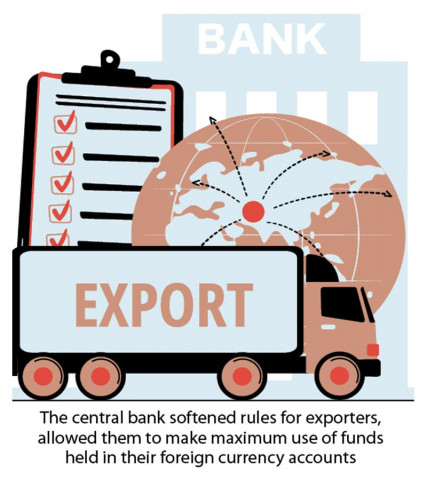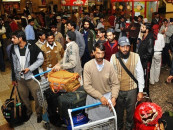SBP eases rules for exporters
Allows utilisation of proceeds kept abroad without central bank’s prior approval

Pakistan’s central bank has softened rules for exporters by allowing them to “freely” utilise the proceeds kept abroad in their Special Foreign Currency Accounts (ESFCAs) without prior approval, a move aimed at boosting export of goods and services.
In a notification sent to presidents and chief executives of all authorised dealers (mainly commercial banks) in foreign exchange, the State Bank of Pakistan (SBP) said “in order to facilitate the exporters and promote ease of doing business, the utilisation of the retained funds has been further liberalised.”
Now, “all exporters will be able to freely utilise the funds held in ESFCAs for making all types of payments abroad of current account nature, for their own business purposes, without prior SBP approval.”
Furthermore, on the request of exporters, the authorised dealers may issue debit cards against the balances held in ESFCAs, it said.
Earlier, the central bank had allowed general exporters to keep 10-15% of export proceeds in their foreign currency accounts. Moreover, freelancers, information technology and software exporters can retain up to 50% of export proceeds.
The notification elaborated that the exporters could utilise the funds to make import payments, acquire IT and digital services from abroad, repatriate dividends to foreign shareholders, market their products in foreign markets and pay salaries to foreign employees.
Exporters could also use the funds for investment abroad and repaying foreign debt. They could not use the funds in foreign currency denominations in Pakistan, but could convert them into local currency for expenditures in the country, the notification added.
Talking to The Express Tribune, Pakistan Business Council Chief Executive Ehsan Malik welcomed the central bank’s move to liberalise the utilisation of the retained funds, believing such measures should spur growth in export of goods and services.
He pointed out that the central bank had notified the authorised dealers to issue debit cards to exporters on request after it capped expenditures by others at $30,000 a year.
Malik was of the view that most of the expenditures mentioned in the notification had already been allowed to exporters. However, the notification addressed the prevailing confusion among exporters.
The liberalisation of expenditures will help exporters to promote sales of their products in foreign markets, utilise funds for overseas travel and pay salaries to foreign employees.
According to Malik, the exporters can also use the funds to acquire a company abroad, subject to the ceiling on their foreign currency accounts.
He said there were specialised marketing firms in the US and Europe, which knew markets better than others as they had a special marketing network. “Acquisition of such companies helps a lot in marketing and promoting Pakistani products in western countries.”
Read Exporters underline need for innovation, diversity
He expected the measures to help grow exports from Pakistan but much depended on the prevailing business conditions abroad. Many foreign countries are still battling the elevated inflation and have kept interest rates high.
He hoped that inflation and interest rates would come down soon, prompting foreigners to increase spending in their respective countries. This will encourage Pakistan to ramp up exports.
The annexure provided by the central bank along with the notification read that the funds of such exporters available in the ESFCA with an authorised dealer may be transferred to the same exporter’s ESFCA maintained with another authorised dealer, upon specific request of the exporter.
Both the authorised dealers shall ensure that the proceeds being credited are from the ESFCA and pertain to the same exporter.
The funds available in ESFCAs cannot be credited and/or transferred to any other foreign currency account and/or FE-25 account. However, on the request of the exporter, the funds available in ESFCA can be converted into Pakistani rupees any time.
Exporters can utilise the retained funds to make payments for import for the purpose of their own business, subject to compliance with the applicable Import Policy Order and related laws/regulations issued by any government department and the SBP, according to the central bank.
Exporters are allowed to make payments for the acquisition of services, IT or digital services from abroad, without prior designation requirement.
The retained funds can be used to pay dividends of domestic entities to their shareholders abroad, provided the shares owned are registered as “repatriable” with the SBP.
They can make payments for operational expenses, including employee salaries, liaison, marketing, and representative offices abroad of local companies in accordance with the provisions.
The funds in ESFCAs can also be used for making payments with regard to capital and financial account transactions, such as equity investment abroad and foreign currency loan repayments. However, in case of remittance of such transactions, a proper procedure as described in the relevant regulations shall be followed.
The authorised dealers are required to facilitate the exporters (on specific request) by issuing debit cards against the balances held in ESFCAs. “However, no cash withdrawal in foreign currency from ESFCAs shall be allowed within Pakistan.”
Published in The Express Tribune, February 25th, 2024.
Like Business on Facebook, follow @TribuneBiz on Twitter to stay informed and join in the conversation.



















COMMENTS
Comments are moderated and generally will be posted if they are on-topic and not abusive.
For more information, please see our Comments FAQ